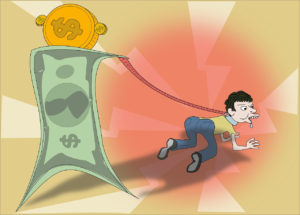Is Bankruptcy The End… Or a New Beginning?
 Shakespeare once said “Neither a lender nor a borrower be”. That’s a nice sentiment, but the bard didn’t live in an era of subprime mortgages, negative equity and business insolvency. In his day, all you had to do was write a few sonnets for a wealthy patron and you were golden. In the 21st century, however, lending and borrowing are not only essential in a realistic business climate, they’re the basis of our entire global economy.
Shakespeare once said “Neither a lender nor a borrower be”. That’s a nice sentiment, but the bard didn’t live in an era of subprime mortgages, negative equity and business insolvency. In his day, all you had to do was write a few sonnets for a wealthy patron and you were golden. In the 21st century, however, lending and borrowing are not only essential in a realistic business climate, they’re the basis of our entire global economy.
In both personal and business finances, peaks and troughs are inevitable, and even the most successful among us have our rough times. From hip hop icon 50 Cent to Mark Twain, many of successful business and creative types face stared down bankruptcy and come through it stronger than ever. Even the billionaire president Donald Trump has been declared bankrupt four times.
Myriad circumstances may result in individuals and businesses filing for bankruptcy. While it’s undeniably a stressful and upsetting experience, it’s important to remember that though there are certainly repercussions following bankruptcy, by no means is it the end.
If bankruptcy is looking like a possibility, or even an inevitability here are some tips that will help you to make an informed decision whether or not to file:
Remember… You are not alone
Facing bankruptcy and feel like an isolating experience, but you are most assuredly not alone. In fact, over 800,000 people applied for bankruptcy in federal court last year. Filing will neither make you a social pariah nor mark you out as a failure. It is, however, important that you do it right, so hiring a bankruptcy attorney should be one of your highest priorities. Your spouse or partner doesn’t even need to file alongside you.
There are different kinds of bankruptcy
In the US there are two forms of bankruptcy; Chapter 7 and Chapter 11 and which you file for will depend on your circumstances. A Chapter 7 requires the business or individual’s assets to be liquidated, using them to pay creditors as much of the outstanding debt as possible. A trustee will be appointed to facilitate the liquidation and ensure that creditors are paid in proportion to the debt. A Chapter 11, on the other hand, reorganizes the debts and adjusts them in terms of repayment amounts and interest rates (much like consolidation).
You may still be able to get credit
You may feel that it’s the end for you and your business, but lines of credit will still be open to you. Remember, however, that over-reliance on credit is what leads many to bankruptcy in the first place. Bankruptcy is a highly instructive tool for many as it teaches them to really appreciate the importance of budgeting and financial planning. That said, the bankruptcy is not quite as prohibitive in terms of credit as many believe.
But it’s important to be realistic
Bankruptcy is intended to wipe the slate clean. It’s a fresh start for businesses and individuals, but it’s not without financial consequences. Credit gets harder to come by (but not impossible) and it could have repercussions on your business borrowing. Bankruptcy can help you but it should also be considered a last resort. You should first consider an alternative such as a consolidation plan before filing for bankruptcy.












